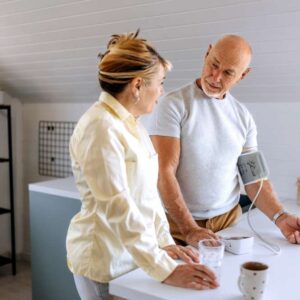
Mailbag: Reverse Atherosclerosis Naturally? Science Says Yes—Here's How
“What actually reverses heart clogging?”
-Heartfelt
Hi Heartfelt,
I have good news. We used to think reversing arterial plaque buildup or “heart clogging” was impossible, but now we know better.
When my own patients ask me about atherosclerosis (the medical term for clogged arteries), I explain that—while complete reversal can be challenging—research confirms that specific lifestyle changes and natural compounds can boost your heart health and significantly reduce the arterial plaque that’s responsible for hardening of the arteries.
Here are some examples:
Diet changes: Studies show Mediterranean and plant-based diets can reduce cardiovascular risks. For example, a study published in the Journal of the American Heart Association found that a Mediterranean-style diet supplemented with extra-virgin olive oil or nuts reduced the risk of cardiovascular events in high-risk individuals.
Regular exercise: A meta-analysis in the Journal of the American Heart Association concluded that regular aerobic exercise reduces arterial stiffness, a key factor in atherosclerosis or clogged arteries. Brisk walking, swimming, pickleball, and water aerobics are just a few fun activities that fit the bill.
Omega-3 fatty acids: Research published in the journal Atherosclerosis suggests that supplementing with omega-3 essential fatty acids can help stabilize and potentially reverse arterial plaques. Look for a high-quality fish oil supplement from a trusted manufacturer.
Pomegranate extract: A study in Clinical Nutrition found that taking pomegranate juice for three years was linked to a reduction in carotid intima-media thickness (a measurement of the thickness of the carotid artery wall that indicates the risk of heart disease) and blood pressure.
Garlic: A meta-analysis published in the Journal of Nutrition found that garlic supplements can reduce blood pressure and improve arterial stiffness.
Berberine: This plant compound improves lipid profiles and reduces inflammation. A study published in the journal Metabolism confirmed that it effectively lowers cholesterol levels and improves heart health.
Vitamin K2: Research published in Thrombosis and Haemostasis suggests that vitamin K2 supplements may help reduce arterial stiffness. But remember, if you’re on a blood thinner, you should always consult your doctor before increasing vitamin K in your diet.
Coenzyme Q10 (CoQ10): Your body naturally produces CoQ10, but levels decrease as you age. A study published in the journal Atherosclerosis found that taking CoQ10 supplements boosts the health of blood vessel walls, improving endothelial function in patients with coronary artery disease.
Intermittent fasting: Time-restricted eating (intermittent fasting) is linked to improvements in heart risk factors, including potentially reducing atherosclerosis.
These natural solutions show great promise for fighting atherosclerosis. But remember, they should always be used as part of a comprehensive heart health strategy and under the guidance of a healthcare professional.
When multiple approaches, such as dietary changes, regular exercise, and supplements, are COMBINED, you will likely get the best results. However, remember that consistency is critical and it can take time to see significant improvements.
Always consult a healthcare provider before starting any new supplements, especially if you’re taking medications or have existing health conditions.
P.S. This “Magical Mineral” trick SLASHES heart risk.
Written By Dr. Scott Olson, ND
Nearly 25 years ago, failed mainstream medical treatments left Dr. Olson in constant pain – and his health in ruins. And that’s when he did something REVOLUTIONARY. He began his career in medicine – and dedicated his life to uncovering the true, underlying causes of disease.
Through his innovative medical practices in Tennessee and Colorado, Dr. Olson has helped cure countless seniors from across America of arthritis… heart disease… diabetes… and even cancer. All without risky prescription drugs or painful surgeries.
View More Free Articles
Is Your Heart Older Than YOU?
Maybe you feel young for your age. Good energy, decent sleep, eating your veggies. But what if I told you your heart might be a decade older than the rest of you? That’s exactly what researchers at Northwestern University found in a new study published in JAMA Cardiology. The average American woman’s heart is about...
Mailbag: 3-Pronged Attack CRUSHES Diabetes at the Source
“They told me I might have diabetes, so I would like to know how I can battle and eliminate diabetes.” —Fighting Back Hi Fighting, You have the exact right attitude—it will be your best weapon in this battle. Let’s face it, receiving a diabetes diagnosis is disturbing. You’re sitting there, shocked and wondering what it...
7 Natural Ways to Beat Jet Lag and Motion Sickness
Are you trying to squeeze in one last vacation this summer? Maybe it’s a beach getaway, a cross-country flight, or even a cruise. But let’s be honest: nothing takes the shine off a vacation faster than feeling nauseous on a boat… or jet-lagged and groggy for days after a flight. So, let’s talk about how...
The Trigger Behind America's Brain Health Crisis
I’ve been warning about ultra-processed foods for years. But I’ll admit—even I was surprised by this latest research. A new study found that your favorite packaged snacks and sweetened beverages might be doing much more than just expanding your waistline. These ultra-processed foods could be setting the stage for serious brain problems down the road....
Doctors Are Taking Your Blood Pressure WRONG—Here's Why
I get frustrated every time I go to the doctor (yes, doctors do go to the doctor) because the people who take my blood pressure almost always do it incorrectly. And before you think I’m just being a cranky know-it-all, let me explain why this matters… How many times have you rushed into the doctor’s...
The Heart Protector Hiding in Your Morning Coffee
You reach for your prescription bottle again, wondering if this is what the rest of your life looks like. Another day, another heart med—and the side effects to go with it. As you down it with a swig of water, you know it will only treat symptoms but never truly address the root cause of...
Blood Pressure STILL High? Check Your Medicine Cabinet
Is your blood pressure running high despite taking your prescription as ordered? Your blood pressure pills might be doing their job—but other medications could be silently sabotaging them without you knowing it. I’ve seen it happen time and again—patients diligently take their blood pressure meds while simultaneously swallowing other pills that send their numbers soaring...
The Diabetes Game-Changer Your Doc Forgot to Mention
A senior patient of mine, diagnosed with diabetes, recently got a continuous glucose monitor (CGM)—and it has been an absolute game-changer. With constant monitoring, her A1C—a crucial long-term measurement of blood sugar control—is now right where it should be. And here’s the bonus: her daughter can help her keep an eye on her blood sugar,...
Mailbag: TORCH Belly Fat with My 7-Step Protocol
“What is the best way to torch white belly fat (asking on behalf of a family member)?” —The Coach Hi Coach. You’re asking a question that keeps countless people up at night, staring at their midsections in the bathroom mirror. And there’s no shortage of so-called “solutions” out there claiming to be the answer. Every...
The Walking Problem Nobody Talks About (And Why It Matters)
You’ve been walking nearly your entire life. You mastered it before you could tie your shoes—and you’ve been putting one foot in front of the other for decades now without giving it a second thought. But what if I told you that the way you walk right now could be the difference between living independently...









